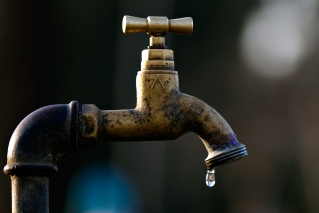
The right to water is a basic human right, which greatly impacts a person’s quality of life. In the West Bank Israel drills water and provides settlements with large quantities of water that are generally sufficient for personal and agricultural needs. Contrary to the situation in settlements, Palestinians living in the West Bank suffer from limited water provision. In various parts of the West Bank water runs through the pipes only on certain days of the week, and for the other days of the week residents store water. This phenomenon gets worse during the hot summer months. In Palestinian villages across Area C residents purchase expensive water delivered by water trucks, as a result of Israel’s policy to forbid their connection to the water grid on the pretext that they lack a zoning plan – a plan that military authorities regularly refuse to approve.
The 1995 Interim Agreement between Israel and the PLO set arrangements on water issues and established the Joint Water Committee. The arrangements allow the Palestinian Authority (PA) to develop and maintain water wells in Area A and Area B, which comprise 40% of the West Bank, on condition that Israel agrees to the location and the size of each drill. Given that the water wells operated by the PA do not extract sufficient water for the entire Palestinian population living in the West Bank, the PA regularly purchases water from Israel.
The following information regarding water provision, allocation and drilling in the West Bank during the years 2010-2016 was received through Freedom of Information Requests submitted by The Association for Civil Rights (ACRI) to Israel’s national water company “Mekorot” and to the Civil Administration (CA). During this six year period the Joint Water Committee did not meet due to objections raised by the Palestinians.
Water Provision:
According to Mekorot, 90.80 million cube meters (MCM) of water were provided by Mekorot in the year 2016 to the Palestinian and the Israeli populations living in the West Bank, not including the Jordan Valley. Of that, 76.7 MCM were transferred by Mekorot from water sources inside Israel proper. The remainder, 14.1 MCM, came from Mekorot water wells located in the West Bank.
Mekorot has over 50 water wells in the West Bank, from which it extracted a total of 47.8 MCM in the year 2016. Given that according to Mekorot 14.1 MCM taken from West Bank water wells were used in 2016 by Palestinian and Israeli populations living in the West Bank but not including the Jordan Valley, the seeming result is that 33.7 MCM of water taken from Mekorot’s West Bank water wells were used in the Jordan Valley alone in 2016.
Water Allocation:
In 2016, Mekorot supplied a total of 67.6 MCM water to all Palestinian communities in the West Bank, including the Jordan Valley. This, out of a total of 90.8 MCM which Mekorot supplied to the West Bank that year. In comparison, in 2010 Mekorot supplied 52.62 MCM to Palestinians living in the West Bank. It is important to note that in addition to the water quantities that the PA purchases from Mekorot it also uses water extracted from its own water wells.
In 2016, Mekorot provided 31.82 MCM of water to Israeli settlements in the West Bank, not including the Jordan Valley. By comparison, in 2010 Mekorot supplied these settlements with 24.2 MCM of water. According to ACRI’s estimates, given that a total of 33.7 MCM from Mekorot water wells were directed in 2016 to the Jordan Valley (see calculation above), and given that 8.62 MCM were provided that year to Palestinian communities living in the Jordan Valley, total of 56.9 MCM of water was therefore provided in 2016 to Israeli settlements across the West Bank, including the Jordan Valley.
Water Drilling:
Operating water wells in the West Bank requires the approval of the Joint Water Committee, as well as permits provided by the CA. In the years 2010-2016 Palestinians received approval for two new water wells, one in Hizme and the second in Janzoor. During this time period the CA carried out enforcement measurements against 28 Palestinian wells, 11 of which were demolished. (See more details on the permit process for water drilling in the CA’s answer to below, in Hebrew.)
Sources:
Mekorot Water Company answer from 14.5.2917 to ACRI Freedom of Information Request (Hebrew)
Civil Administration answer from 20.9.2017 to ACRI Freedom of Information Request (Hebrew)







